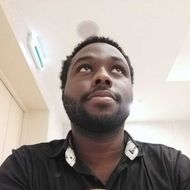“I got the opportunity to see the computer science principles applied in a different domain. It’s one thing knowing that they can be applied in multiple domains but it’s another seeing it up close.”
Frank Acquaye is a PhD student at the Department of Data Analysis and Artificial Intelligence, Faculty of Computer Science, National Research University Higher School of Economics. As part of his postgraduate studies, Frank spent several months in the Noble Research Lab at the University of Washington, USA, where he did research.

PhD student
Could you tell us a few things about yourself?
My name is Frank Acquaye and I am a Ghanaian PhD student at the Department of Data Analysis and Artificial Intelligence. I work at the Laboratory on AI for Computational Biology. My current research is focused on developing a deep neural network for annotation of tandem mass spectrometry data.
Why did you choose to do research at the Laboratory on AI for Computational Biology?
Having obtained my bachelor’s in computer science (University of Cape Coast - Ghana) and working extensively as a software engineer before my master’s studies at HSE University, I had become more interested in applied research as opposed to theoretical.
I guess that for me applied computer science research is closer to software engineering (i.e writing code). For this reason, whilst I was working with Dr. Quentin Paris on my term paper, he introduced me to Dr. Attila Kertesz-Farkas. This was due to the fact that Dr. Paris is involved in theoretical research and Dr. Kertesz-Farkas does applied research.
I remember Dr. Paris telling me: “I think that you would enjoy working with him.” He was right — I did. Ever since that term paper I have worked with Dr. Kertesz-Farkas
How did you find out about this lab?
During my master’s studies, I worked with Dr. Kertesz-Farkas on my term paper, internship, and thesis, so when he started the lab, we already had a working relationship.
What are you working on now? Which is your main research interest?
I am now working on a deep learning framework for annotating tandem mass spectrometry data. Currently, molecular biologists tend to use a complex pipeline of algorithms with many parameters to accurately annotate the data. My goal is to replace this pipeline with a deep learning framework. In other words, I want to use deep learning to tell what peptides or proteins are present in a given sample of mass spectrometry data.
Which lab did you choose for doing research in the US? Why did you choose it?
I visited the Noble Research Lab at the University of Washington. This was primarily due to the fact that the Laboratory on AI for Computational Biology has a research collaboration with the Noble Research Lab.
What advice would you give to students who are planning to go to do research abroad?
Try to do a bit of sightseeing when you go abroad, don’t spend all your time working like I did. More importantly, try to network, build meaningful connections for your career and perhaps even make some friends.
What did you like the most in the US? Does it make an impression?
I personally think Moscow is more beautiful, but then again, I have stayed here longer and had the chance to explore. Also, it was nice that everyone spoke English — that made life a bit easier. Plus I got the chance to experience Microsoft Campus which was one of the highlights of my trip — maybe because I come from a computer science background.
What about your non-work life?
The people in the lab were very friendly and welcoming. I got to visit my first baseball game which was interesting. We went hiking with the lab. Also, I visited California and got to see the Salesforce Tower and the Golden Gate Bridge.
How is work organized in the US labs?
I may have been in a bubble but it seems as though there was a bit more social interactions in the US. I believe this is primarily due to the fact that I barely speak Russian, so my opinion may be skewed. Also, I feel that in the lab I went to the students behaved a bit more informally with their superiors, although still very respectfully.
What opportunities did the trip give you?
I got the opportunity to see the computer science principles applied in a different domain. It’s one thing knowing that they can be applied in multiple domains but it’s another seeing it up close. So I would assume that this has shaped my mentality on applied research.
Can you do a summary of your research in the US?
I was working on implementing a label free quantification method for analyzing mass spectrometry data, i.e. the ability to tell the amount of a specific kind of peptide/protein present in a given spectrum sample.
What do you want to work on in the future?
I am fascinated by all things computer science but, being a software engineer, I am interested in building tools and algorithms that can be used in the natural sciences. If I could pick an applied area of computer science that fascinates me the most, that would be machine learning, machine reasoning and computational science, hence I would love to work on this.
